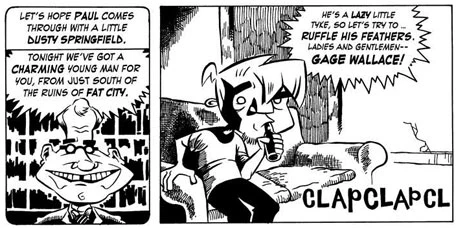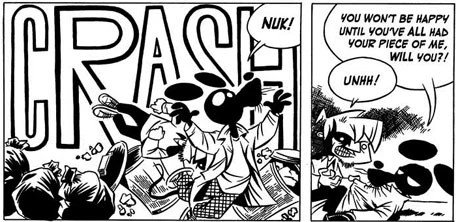
Scott Allie On The Method To The Madness Of ‘Exurbia’
 As Senior Managing Editor of Dark Horse and the creator of Scott Allie knows a little something about something. He's worked alongside Hellboy creator Mike Mignola for years and now effectively steers the comic book destiny of Joss Whedon's Buffy franchise, Gerard Way's "Umbrella Academy" and more.
As Senior Managing Editor of Dark Horse and the creator of Scott Allie knows a little something about something. He's worked alongside Hellboy creator Mike Mignola for years and now effectively steers the comic book destiny of Joss Whedon's Buffy franchise, Gerard Way's "Umbrella Academy" and more.
But long before Allie collaborated with some of the most celebrated talent in the industry, the writer and editor was a college student with a head full of ideas and not enough time to make them happen.
Allie and artist Kevin McGovern's urban satire "Exurbia" finally arrived in stores this past October after gestating over the course of several years.
The black-and-white graphic novel follows the story of Gage Wallace, a suburbanite battling apathy and losing. Badly. After losing his city, his drive, his girl and being framed for city-wide bombings, Gage's only hope is to confront his tragic past, the city's rat messiah and reconcile his talents with his circumstances.
Read on for Allie's take on the craft of comic creation, his "Exurbia" inspiration and the bonus feature future of the series.ComicsAlliance: From what I've read, you and [artist] Kevin McGovern had been waiting to work together on Exurbia for awhile. Can you tell us a little about project's journey from concept to release?
Scott Allie: It originated clear back in college. I had an idea for a stage play, in which a character argues with himself via a pre-recorded video tape, carefully timed out. I was gonna write it, I had my director and actor picked out, and just never got around to it. When I was starting a self-published horror comic, Sick Smiles, a few years later in Portland, I wanted to revisit it. Since Sick Smiles was a horror comic, I didn't feel like this idea merited a lot of space-since it wasn't in the genre-so I just did it in four pages. But the character, Gage, really felt like something to me and to Kevin, so we kept talking about him and this world we'd set him in. And it grew from there. The Rat, the next most important character, came a little bit later, when Kevin was doing sleeve art for a friend's 45, and just drew this nasty rat smoking a cigar. His whole personality took shape the minute Kevin showed me that drawing.

CA: When it comes to personal projects, fans can't help but scan stories for real or perceived autobiographical allusions to the author's life. How much of "you" and your own experiences do you think lives in Gage and the other characters?
SA: Well, autobiographical in that it reflects my outlook. I think Gage is me, Kevin thinks he's him. A lot of my experiences go into Gage in little ways, but the main events of his life are nothing like mine. If there were a giant talking Rat in my town that everyone worships, I think my attitude toward him would be the same as Gage's.

CA: The often surreal, alternate world of "Exurbia" is dotted with references to the real world (Letterman on TV, Star Wars at the video rental shop, Eliza Dushku, etc.). How important do you think these touchstones are in the overall story? Are they simply fun tethers to a reader's own experiences or something more?
SA: The world in Exurbia is so strange, I wanted some reference points. I seldom get to do that-I do period stuff, I do things that are concretely outside out reality, so having the chance to be contemporary was nice. Also, Exurbia to some degree is social commentary, I guess, or just a skewed look at the modern world, so I needed to touch directly on the real world to do it. The references have had to change over time. There's that thing in the back of the book where I explain the TV joke that had to change from first draft to final. Well, originally the Eliza Dushku reference was Jennifer Garner, and there's something in there about Speidi, that had been a reference to Bennifer. You even remember that crap? The funny thing is, the gag about Star Wars repackaging-I didn't have to change that joke because even all this time later, they're still reissuing those in new editions. That joke will always work.

CA: There are a few sources of conflict in "Exurbia," but Gage's quest to regain passion in a city without individuality seems like the crux of the story. How important was it to you to personify not only religion but celebrity worship in the character of The Rat? Was it a question of allowing Gage to define himself through their interactions? Who in modern culture most embodies your idea of who The Rat is?
SA: Well, with the Rat, religion was the initial target, but the celebrity obsession happened naturally, accidentally. They've become the same, and it was easier for me to address the celebrity worship thing. I observe pop culture on a daily basis; I don't pay a lot of attention to religion. So initially I set out to make fun of religion, but making fun of it as an outsider was sort of cold. With the celebrity thing, I had more immediate insight. Also, hanging out with Gerard Way has really given me some perspective on that issue.
CA: As an editor you spend a pretty hearty portion of your time helping other creators refine their vision. Did you find your editing instincts a help or a hindrance in completing "Exurbia?"
SA: A big help. I look at the creative process from a few different vantage points, and the editing experience has given me some objectivity that I'm happy to bring to the subjective, nail-biting, 3-am-at-the-computer creative side. It also informs the way I work with Kevin.
CA: One element of "Exurbia" I found interesting was it's cartoonization of profanity ($%*&'s) despite the fact that it's definitely not an all-ages book. Was this a stylistic choice, a matter of personal preference between you and McGovern or am I reading way too much into that detail?
SA: I'm happy to avoid profanity in comics. For some books avoiding it would be silly, and for some books it belongs, but if it's not an essential part of the mood, I'd rather leave it out, just so one less mom goes flipping out on one less retailer. I know there's something lame about giving into that sort of pressure, but I don't feel like it's sacrificing much. Arvid Nelson had never had a word of profanity in "Rex Mundi," and then in the nineteenth issue he threw in either shit or fuck. I discouraged him from doing it, just because it came so out of nowhere, seemed so unimportant, and I can't help think of that uptight asshole in Poughkeepsie who's gonna go off on some retailer. Frank Miller avoids profanity in Sin City, believe it or not. Most people don't believe that when I say it, but go back and look. Randy Stradley, who edited Frank on the first series, told me that Frank didn't like to have the worst curse words in there because it's different in print than in film. When Robert DeNiro is up there on the screen dropping F-bombs in Mean Streets, it cruises right by you, you roll with it, it seems natural. But for a lot of readers, seeing profanity in cold, stark text stops you. I think he's got a point. I have some nudity in the book, although the decision to have nudity didn't come until I was writing the strip club scene, and I'd already been using the %#$& for a long time at that point.

CA: Tell us a little about the upcoming "Exurbia" 7-page story. The initial story seems fairly self-contained. Is the new story a sequel, prequel, expansion?
SA: 8-pager! Kevin and I did a book tour up and down the coast, and on the drive we came up with this story. It's focused on the Rat, and on the beginnings of his cult status. So it's a prequel. It shows the bums, Sten and Steve, and how they first become impressed with the Rat. Dave Stewart's coloring it, and so we're doing some things with color we couldn't do in black and white, storytellingwise. I'm excited about it. We also have another character from the graphic novel, an extremely minor character, who sort of gets his origin story here.
CA: Can you give us a rough idea of your plans for "Exurbia" after the upcoming short?
SA: No plans! We didn't plan on doing more with it, but the MDHP thing came up. We don't want to continue the story forward, because of the character that dies, the shape we leave everyone in, including Gage. Having Gage says what he says to the entrepreneur, that's the last we need to know of Gage, I think. But the Rat is really fun, and so doing something with him predating the graphic novel was exciting. I'm sure we'll find an excuse to do it again one of these days. S
More From ComicsAlliance



![Comics Alliance Reader Choice Awards: Best Editor [Poll]](http://townsquare.media/site/622/files/2014/01/comicsalliance22.jpg?w=980&q=75)
![Freedom Of Expression: Editor Scott Allie On The ‘CBLDF Liberty Annual 2013′ [Interview]](http://townsquare.media/site/622/files/2013/08/cbldflibertyannual2013main.jpg?w=980&q=75)

![Gerard Way And Scott Allie On ‘Killjoys’ And The Future Of ‘ The Umbrella Academy’ [Interview]](http://townsquare.media/site/622/files/2012/12/gerardwayallieinterview-1355775843.jpg?w=980&q=75)
![Dark Horse Says Happy Halloween With Edgar Allan Poe, Richard Corben And Mike Mignola [Exclusive]](http://townsquare.media/site/622/files/2012/10/untitled-4-1351724535.jpg?w=980&q=75)

